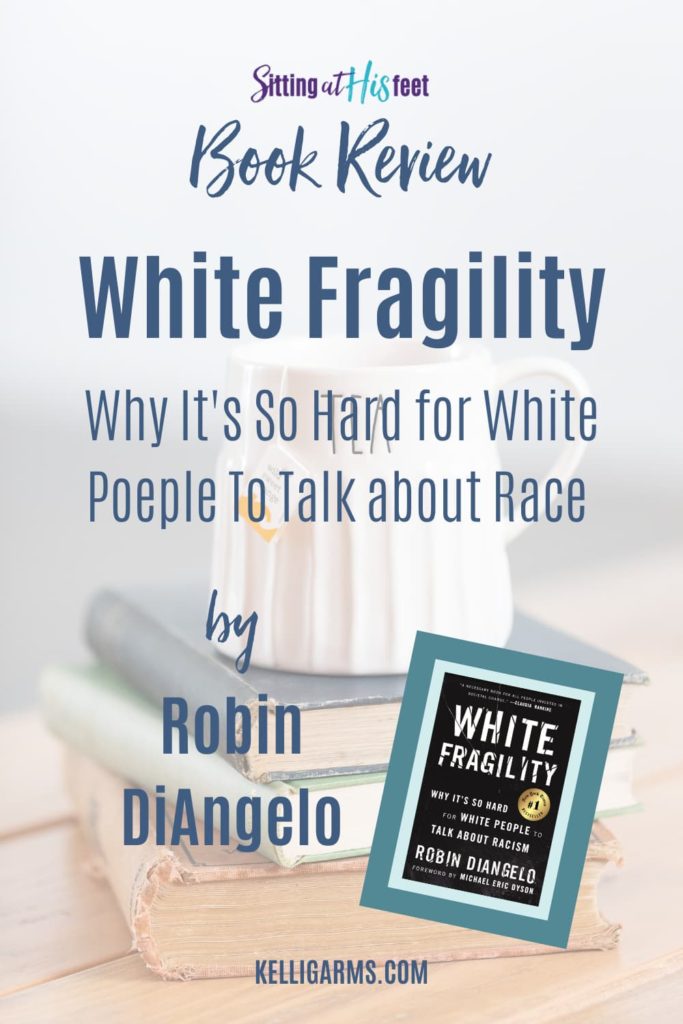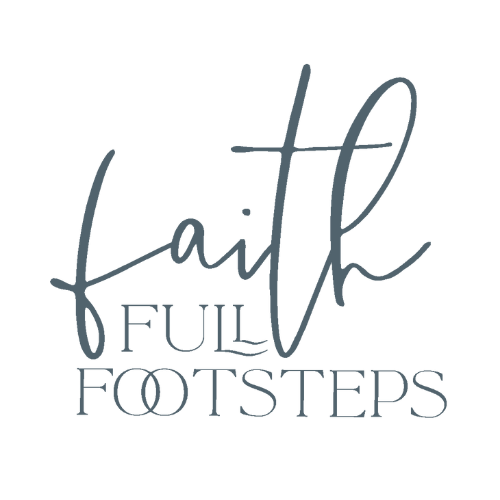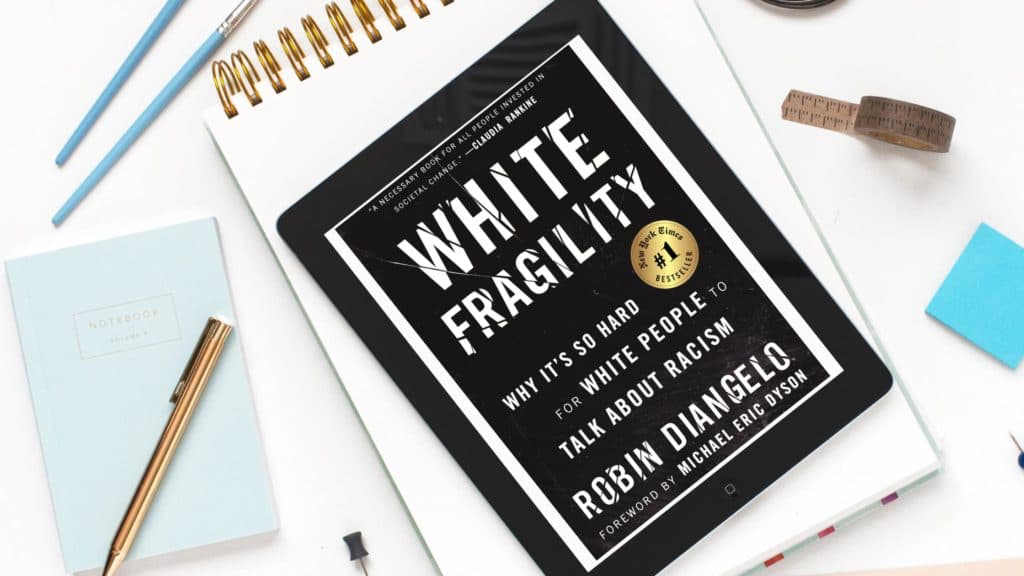Disclaimer: I believe there is only one race—the human race. Every time I use the terms “white” or “black” to describe people in this post, I am speaking from DiAngelo’s point of view, not mine. While she claims race is a social construct, she continually refers to people by the color of their skin in her book, White Fragility.
Honestly, I was hesitant to read Robin DiAngelo’s book, White Fragility: Why It’s So Hard for White People to Talk About Racism. While I felt I was solid on critical race theory and the social justice movement, the fact that this book has become required reading for our military, educators, and even some church staff members led me to believe it held strong arguments and evidence for social justice. Let me begin by laying those fears to rest. They were completely unfounded.
There are so many problems with the logic of the book that it is difficult to know where to begin unravelling the tangle of ideas presented. Fortunately, DiAngelo leaves many loose threads to pull.
Conflict of Interest in White Fragility
It is important that we “follow the money.” It cannot be overlooked that DiAngelo makes her living by visiting corporations and teaching the employees how to eliminate racism in the work place. She says, “My job is to help individuals and organizations see how racism is manifesting itself in their practices and outcomes” (73). Therefore, it would follow, if she does solve the problem of racism, it is to her detriment because then she is out of a job.
And this is a lucrative business! DiAngelo charges $15,000 to $40,000 per event depending on the length and involvement. When you consider that she participates in 8-10 events per month, it is understandable that she owns three homes. She even charges $5 per minute as a phone-call fee!*
Eradicating racism would not serve her interests. If you keep this in mind as you read the book, it clears up some very confusing sections.
Logical Fallacies in White Fragility
The book is riddled with logical fallacies. A logical fallacy is an error in reasoning. In other words, it is a way of arguing a point of view that is not based on reason. Instead, DiAngelo bases her arguments on linguistic theft, Kafka traps, and hasty generalizations to name just a few.
Linguistic Theft
Linguistic theft is the practice of hijacking words. When someone takes a well-known word and changes the meaning to fit a narrative or agenda, that person is involved in linguistic theft. This is why it is so important to define terms before you begin a discussion. You might be using the same word but have completely different meanings.
DiAngelo asks her readers to accept her definition of words like racism, white supremacy, and prejudice or discrimination. And the truth is you must accept her definitions in order for her arguments to make sense. If you hold to the historical definitions of these words, not only does her argument fall apart, but also she proves she is terribly racist herself.
As a result of DiAngelo’s definition of racism—that it must be systemic in order to exist—she claims reverse racism is not possible. She says, “People of color may also hold prejudices and discriminate against white people, but they lack the social and institutional power that transforms their prejudice and discrimination into racism; the impact of their prejudice on whites is temporary and contextual” (22). Her linguistic theft also takes all individual power away from “blacks” by undermining and dismissing any accomplishments they may have in our “racist” society, making them what is known as “tokens.”
Kafka Trap
A Kafka trap is using a denial of an argument as evidence of guilt. No other evidence is needed or provided. For example, if someone is accused of being a spy, and he denies that he is a spy, isn’t that what a real spy would do? Therefore, he must be a spy.
DiAngelo uses the Kafka trap for her term white fragility. “White fragility” is the explanation for “white” people “struggling to talk about race” (i.e. getting offended for being called racist). When every disagreement is dismissed as “white fragility,” there can be no meaningful conversation. DiAngelo says, “White fragility can only protect the problematic behavior you feel so defensive about; it does not demonstrate that you are an open person who has no problematic racial behavior” (76). She goes on to say, “Denial and the defensiveness that is needed to maintain [white fragility] is exhausting” (149). It is also exhausting to have your points of argument dismissed without consideration.

There is no upside for “white” people in DiAngelo’s estimation. Even when “white” people participate in discussions, events, and legislation that benefit the “black” community, they are only doing it to their own gain (26). Should we apply this same logic to her contributions? She indicts owners of baseball teams for making money off of their “black” players, while sales of her book continue to soar.
Anecdotal Evidence
The anecdotal evidence fallacy substitutes someone’s personal experience for logical evidence while neglecting the possibility that it could be an isolated example rather than the rule or standard. While the entire book is based solely on anecdotal evidence (DiAngelo’s personal experiences), DiAngelo reprimands “white” people for assuming that their experiences are the same as those of “blacks.”
I agree that we should not project our experiences on others, but I don’t base that belief on the amount of melanin in someone’s skin. My life experiences as an ex-pat kid are vastly different than the experiences of most “white” people and “black” people alike. DiAngelo goes so far as to tell “whites” they should treat “blacks” differently simply because the color of their skin has inevitably made their experiences different. This is why she must change the definition of racism; she tells “whites” they must be racist in the historical sense of the word.
Hasty Generalization
In a hasty generalization fallacy, a conclusion is determined before enough evidence is presented or examined to make an accurate judgement. In other words, it is jumping to conclusions.
DiAngelo attributes every discomfort a “white” person feels to racism. She tells the story of being invited to a work party at a park. When she arrived at the park, there were two separate parties going on. She was unsure which party was the one to which she was invited. Fortunately, she approached the correct group of people. She attributes her discomfort to the fact that the “wrong” group was made up mostly of “black” people. Therefore, her discomfort was her racism showing. Wouldn’t she feel uncomfortable at the thought of approaching the wrong group simply because she would be crashing their party regardless of the color of their skin?
She also includes an anecdote of a toddler sitting in a shopping cart at the store pointing and saying loudly, “Mom, that man is black.” In this story, the mom proceeds to shush her child. DiAngelo claims the mom would only shush her child because she believes “blackness” is inferior. I would argue that a mom would shush the toddler because our society has made it politically incorrect to point out facts because they might offend someone.
Political Agenda in White Fragility
DiAngelo uses her book and her arguments to criticize Trump and those who voted for him while promoting the rights of undocumented workers, immigrants, and the Chinese…the Chinese! While the entire book is based on the premise that America is systemically racist, she is arguing in favor of the Chinese—a country that, at the time of this writing, has placed an entire “race” of people into concentration camps to torture them, experiment on them, and ultimately annihilate them.
And let’s not forget that, from its founding, America has fought to abolish slavery and discrimination. It has not always done so perfectly, or even well, but we have always been in the fight. Of course, this isn’t the history DiAngelo presents. Instead, she says, “The past was great for white people (and white men in particular) because their positions went largely unchallenged. In understanding the power of white fragility, we have to notice that the mere questioning of those positions triggered the white fragility that Trump capitalized on” (59).
Puzzling Use of White Fragility in Churches
Most concerning to me is the fact that churches are adopting the ideas presented in this book and requiring staff members to read it and endorse it. Beyond discussing racism, DiAngelo enters the gender discussion, and she attacks the “traditional” family. Both of these are defined for us in Scripture.
While I agree with DiAngelo that race is a social construct, I don’t agree with her statement that this applies to gender, as well. You don’t have to get very far in your reading of the Bible to find that God created male and female. That’s it—just the two genders. And He created the woman to be a help meet to the man. In other words, men and women have distinct characteristics and roles to play. This is a gift from God; it is not a social construct.
DiAngelo also attacks the “traditional” family. She says, “The romanticized ‘traditional’ family values of the past are also racially problematic” (61). Again, the family is an institution defined for us in Scripture. And, again, you don’t have to read very far in the Bible to find it. The fact that churches are endorsing this book which specifically attacks biblical positions is mind-boggling.
Candace Owens said it best in a recent episode of The Candace Show when discussing Ibram X. Kendi’s writing (Kendi is another “authority” in the anti-racism movement): “Martin Luther King never had to focus on the ‘not racist.’ He was just focused on racists because there were plenty of them […] That’s not the times we’re living in anymore. Ibram X. Kendi […] realizes that actually there’s not enough racism in America […] so he has to move the goal post and find racism where it’s not, which is amongst the people that are not racist. […] That should really say to you how great this country is […] America is in a really good place when it comes to race.” (Episode 19). I would apply this statement to DiAngelo’s work, as well.
The main thing White Fragility taught me is that Robin DiAngelo is one of the most racist people I have ever come across (though I can honestly say I haven’t come across many racist people). She says, “I grew up in poverty and felt a deep sense of shame about being poor. But I also always knew that I was white, and that it was better to be white” (19). I have never believed that being “white” was to be better. This statement says more about DiAngelo and her upbringing than it does about racism in America.
There are so many more logical fallacies, contradictions, and racist statements made in the book, but frankly, I’m tired. The circles DiAngelo requires her readers to run are exhausting. Below, I’ve linked alternative resources that give a more clear and researched perspective of what is really going on in the “race wars” of our country.
Resources
- Christianity and Wokeness by Owen Strachan
- Fault Lines by Voddie Baucham Jr.
- Blackout by Candace Owens
- Christopher Rufo’s website
- Neil Shenvi Apologetics website
- Just Thinking Podcast
- Critical Race Theory: A Biblical Perspective






0 Comments